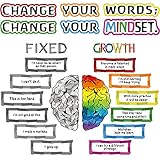Are you looking to enhance your emotional intelligence and improve your overall mindset? Look no further than exploring the link between the two.
Emotional intelligence, or the ability to recognize and manage your own emotions as well as those of others, plays a crucial role in personal and professional success. And your mindset, or the way you approach and perceive challenges and obstacles, can greatly impact your emotional intelligence.
In this article, we will dive into the connection between mindset and emotional intelligence, exploring the different types of mindsets and providing practical tips for cultivating a growth mindset. We will also discuss the benefits of emotional intelligence and how to use mindset to build it.
By the end, you will have a better understanding of how your mindset can impact your emotional intelligence and practical ways to improve both.
Key Takeaways
- Mindset greatly impacts emotional intelligence, with those having a growth mindset more likely to develop it.
- Emotional intelligence is crucial for personal and professional success, improving communication skills and building and maintaining positive relationships.
- Developing empathy and self-awareness, embracing challenges and setbacks, and practicing mindfulness can improve emotional intelligence.
- Improving emotional intelligence can lead to better decision-making, handling of stress, and overall leadership and connection with others.
What is Emotional Intelligence and Why is it Important?
Emotional intelligence, or the ability to recognize, understand, and manage one’s own emotions and those of others, is crucial for personal and professional success.
It plays a significant role in building and maintaining positive relationships, both personal and professional. Having a high level of emotional intelligence allows you to communicate effectively with others, understand their needs and emotions, and respond appropriately.
The importance of emotional intelligence in relationships cannot be overstated. It helps you be more empathetic, understanding, and supportive of your loved ones. It enables you to handle conflicts and disagreements in a constructive manner, which strengthens the bond between you and your partner or family members.
Besides, emotional intelligence also has a significant impact on workplace success. Studies have shown that people with high emotional intelligence are more likely to be successful in their careers. They’re better at managing stress, building relationships, and making sound decisions, which are all essential skills in today’s fast-paced and competitive work environment.
The Different Types of Mindsets
Understanding the various types of mindsets can provide insights into how you approach challenges and opportunities in your life. There are two main types of mindsets: fixed and growth mindsets. Those with a fixed mindset believe that their abilities and traits are predetermined and unchangeable. They tend to avoid challenges and give up easily when faced with obstacles.
On the other hand, those with a growth mindset believe that their abilities and traits can be developed through effort and hard work. They embrace challenges and persist through difficulties. In addition to fixed and growth mindsets, there are also closed and open mindsets.
Those with a closed mindset are not receptive to new ideas or perspectives. They tend to be resistant to change and dismissive of feedback. In contrast, those with an open mindset are curious and willing to learn. They seek out new experiences and ideas, and are open to feedback and constructive criticism.
By understanding these different types of mindsets, you can begin to identify your own mindset and work towards developing a more growth-oriented and open mindset.
How to Cultivate a Growth Mindset
To cultivate a growth mindset, you should start by setting achievable goals and celebrating your progress along the way, which will motivate you to keep pushing forward towards your ultimate objectives. This means embracing challenges as opportunities for growth and learning, rather than avoiding them out of fear of failure.
Developing resilience is also key, as setbacks and obstacles are inevitable on the path to success. Instead of giving up or becoming discouraged, focus on finding solutions and learning from your mistakes.
Another important aspect of cultivating a growth mindset is embracing the power of yet. This means recognizing that just because you may not be good at something now, doesn’t mean you can’t improve with time and effort. Use the word yet to reframe negative statements into positive ones that reflect a growth mindset.
For example, instead of saying ‘I’m not good at public speaking,’ say ‘I’m not good at public speaking yet, but I’m working on improving my skills.’ With this mindset, you can approach challenges with a sense of curiosity and a desire to learn, rather than fear and self-doubt.
Practical Tips for Building Emotional Intelligence
If you want to build your emotional intelligence, there are a few practical tips you can start implementing today.
First, you need to learn how to recognize and label your emotions. This means becoming more aware of what you’re feeling and being able to put a name to those feelings.
Next, practice empathy by trying to understand how others are feeling and putting yourself in their shoes.
Finally, work on responding instead of reacting to situations, taking time to think before you speak or act.
By following these tips, you can start building your emotional intelligence and improving your relationships with others.
Recognize and Label Emotions
As you go about your day, take notice of the feelings that arise within you and try to put a name to them, painting a vivid picture of your emotional landscape. Recognizing and labeling emotions is a crucial step in building emotional intelligence. It helps you identify triggers and understand your reactions, allowing you to respond in a more mindful and effective way.
To help you get started, here is a table that outlines some common emotions, their definitions, and physical sensations they may be associated with:
| Emotion | Definition | Physical Sensations |
|---|---|---|
| Anger | A strong feeling of annoyance, displeasure, or hostility | Pounding heart, clenched fists, tightness in the chest |
| Sadness | A feeling of unhappiness or sorrow | Heavy heart, tears, low energy |
| Fear | An unpleasant emotion caused by the threat of danger, pain, or harm | Rapid heartbeat, sweating, trembling |
| Joy | A feeling of great pleasure and happiness | Smiling, laughter, lightness in the body |
| Disgust | A feeling of revulsion or strong disapproval | Nausea, wrinkled nose, avoidance behavior |
| Surprise | A feeling of mild astonishment or shock | Wide eyes, raised eyebrows, gasping |
By identifying and labeling your emotions, you can gain a better understanding of yourself and your reactions to different situations. This knowledge can help you develop a stronger sense of emotional intelligence, leading to more positive interactions with others and a greater sense of self-awareness.
Practice Empathy
Now that you’ve learned how to recognize and label emotions, it’s time to take a step further in developing emotional intelligence. This means practicing empathy, or the ability to understand and share the feelings of others. By doing so, you can improve your communication skills and strengthen your relationships with those around you.
Developing empathy is not always easy, especially when it comes to dealing with difficult people or situations. However, it’s a skill that can be learned and improved over time.
Here are three ways to practice empathy and improve your emotional intelligence:
-
Listen actively: When someone’s speaking to you, make an effort to truly listen to what they’re saying. Pay attention to their tone, body language, and the emotions behind their words.
-
Put yourself in their shoes: Try to imagine yourself in the other person’s situation and how you’d feel if you were in their place. This can help you better understand their perspective and emotions.
-
Respond with compassion: When responding to someone, show empathy by acknowledging their feelings and responding with kindness and understanding. This can help build trust and improve communication in your relationships.
By practicing empathy, you can improve your emotional intelligence and become a better communicator. It takes time and effort, but the benefits are worth it in both your personal and professional life.
Respond, Not React
Let’s learn how to respond, not react, in order to improve our interactions with others and avoid unnecessary conflicts.
When we react to a situation, we tend to act impulsively without much thought, which can lead to negative outcomes. However, when we respond, we take a mindful approach and consider our emotions and thoughts before taking action.
One way to respond instead of react is to practice mindful breathing. When we feel overwhelmed or triggered, taking a few deep breaths can help us to regulate our emotions and calm our minds. This can give us the clarity we need to respond in a way that is more thoughtful and intentional.
By practicing mindful breathing, we can become more aware of our emotional state and learn to respond in a way that aligns with our values and goals.
The Benefits of Emotional Intelligence
You’ll discover how emotional intelligence can benefit you in many ways. Developing empathy and self-awareness in emotional intelligence can help you become more successful in both your personal and professional life. Here are some ways that emotional intelligence can be beneficial:
-
Improved Communication: Emotional intelligence can improve your communication skills by helping you understand and manage your emotions better. This will enable you to communicate more effectively with others.
-
Better Relationships: When you’re emotionally intelligent, you can connect with others more easily. This, in turn, can lead to better relationships with your friends, family, and colleagues.
-
Increased Job Performance: Emotional intelligence can help you become a better leader and improve your job performance. When you’re able to understand and manage your emotions, you’re better equipped to handle stressful situations and make better decisions.
By developing your emotional intelligence, you can reap these benefits and more. So, take the time to reflect on your emotions and work on improving your emotional intelligence. It’ll be worth it in the long run.
Bringing it All Together: Using Mindset to Build Emotional Intelligence
As you delve deeper into the concept of emotional intelligence, incorporating a growth mindset can aid in the development of this skill set. Mindset practices such as focusing on learning and growth rather than fixed traits can help individuals become more self-aware and open to feedback.
By adopting a growth mindset, individuals can view failures and setbacks as opportunities for learning and growth, rather than as permanent reflections of their abilities.
Self-awareness techniques can also be used to build emotional intelligence. By becoming more aware of your own emotions, you can better understand how they impact your behavior and interactions with others.
Mindfulness practices, such as meditation and deep breathing, can help individuals become more present and aware of their emotions in the moment. By practicing self-awareness techniques regularly, individuals can improve their emotional regulation, communication skills, and overall emotional intelligence.
Frequently Asked Questions
What are some common misconceptions about emotional intelligence and mindset?
You might have some misconceptions about emotional intelligence and mindset. For starters, you might think that emotional intelligence is all about being nice or having a positive attitude, but it’s actually about being aware of your own emotions, managing them effectively, and being able to understand and relate to the emotions of others.
Similarly, you might think that mindset is just about positive thinking or having a can-do attitude, but it’s really about the beliefs and attitudes that shape your thinking and behavior.
Understanding the importance of mindset and emotional intelligence in personal growth is crucial, as they both play a significant role in shaping your experiences and relationships.
By recognizing and challenging any misconceptions you might have, you can start to develop a more accurate understanding of these important concepts and use them to enhance your personal growth.
How does childhood upbringing and experiences affect one’s mindset and emotional intelligence?
Your childhood upbringing and experiences have a significant impact on both your mindset and emotional intelligence. The debate between nature versus nurture is ongoing, but it’s widely accepted that both play a role in shaping who you are.
Trauma, for instance, can have a lasting effect on your mindset and emotional intelligence. It can lead to negative beliefs about yourself and the world around you, making it difficult to develop a growth mindset and build healthy relationships with others.
On the other hand, positive childhood experiences can foster a growth mindset and emotional intelligence, allowing you to approach challenges with resilience and empathy.
Overall, your early life experiences can shape your mindset and emotional intelligence, but it’s possible to develop and improve these qualities throughout your life.
Can emotional intelligence be improved at any age or is it a fixed trait?
You may wonder if emotional intelligence can be improved at any age or if it’s a fixed trait. The good news is that emotional intelligence can be improved with effort and practice, regardless of age.
One of the most effective ways to improve emotional intelligence is to adopt a growth mindset, which means believing that you can develop and learn new skills. With a growth mindset, you’ll be more open to feedback and willing to learn from mistakes. This attitude can help you develop better self-awareness, empathy, and social skills, all of which are essential components of emotional intelligence.
The benefits of a growth mindset go beyond emotional intelligence, as it can also lead to greater resilience, creativity, and success in all areas of life.
Are there any negative consequences to having a growth mindset, and if so, how can they be avoided?
When it comes to having a growth mindset, there can be some limitations that you should be aware of. While having a positive attitude towards growth and learning can be beneficial for your personal and professional development, it’s important to balance your mindset with emotional intelligence.
Without emotional intelligence, you may become too focused on achieving your goals and overlook important factors such as the well-being of yourself and others. To avoid this, it’s important to cultivate both a growth mindset and emotional intelligence.
By doing so, you can overcome the limitations of a growth mindset and achieve success while maintaining healthy relationships with those around you.
How can organizations incorporate emotional intelligence and growth mindset principles into their culture and policies?
To incorporate emotional intelligence and growth mindset principles into your organization’s culture and policies, you can start by implementing training programs that focus on developing emotional intelligence skills and fostering a growth mindset.
Encourage employee engagement by providing opportunities for them to learn and grow, and creating a supportive environment where they feel comfortable taking risks and making mistakes.
Make sure your policies reflect these principles by emphasizing collaboration, learning, and self-improvement.
By prioritizing emotional intelligence and growth mindset in your organization, you can create a culture that supports innovation, resilience, and success.
Conclusion
Congratulations! You’ve just learned about the link between mindset and emotional intelligence.
By cultivating a growth mindset, you can develop your emotional intelligence and become more aware of your own emotions and those of others. This can lead to better relationships, improved communication, and increased success in both your personal and professional life.
Remember, building emotional intelligence takes time and effort. It’s important to practice self-awareness, empathy, and effective communication skills regularly.
By doing so, you can become more emotionally intelligent and able to navigate challenging situations with ease. So, keep working on your mindset and emotional intelligence, and watch as your life transforms for the better!















































































































